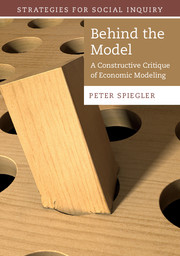4 - The New, New Institutional Economics
from Part II - The critique applied
Published online by Cambridge University Press: 05 December 2015
Summary
This chapter examines a relatively new offshoot of the institutional economics literature that we can call the New, New Institutional Economics, or “NNIE,” to distinguish it from the New Institutional Economics associated with, inter alia, Douglass North and Oliver Williamson. NNIE is an ambitious approach to institutional economics that includes important contributions from Daron Acemoglu, James Robinson, Andrei Shleifer, Edward Glaeser, and others. Its practitioners employ highly parsimonious formal models to capture the central role of institutions in the explanation of various grand historical changes in power, politics and long-term economic trends, including, among others, the success and failure of democratization, the rise of the American regulatory state, and the prospects for the realization of Immanuel Kant's state of perpetual peace. The work has appeared in top economics journals and in the books of top university presses, though up to now it has received little attention within the institutional economics literature for its achievements. This lack of recognition should not be interpreted as evidence that the work is not properly categorized as “institutional economics.” Its practitioners are using economic methodology to investigate the role of socio-politico-economic institutions in economic activity and thus their work falls, undeniably, on the turf of institutional economics.
This chapter offers an overview and methodological assessment of this work, concluding that although the NNIE has built upon and extended the work of the Old and New Institutional Economics in important ways, it has, at the same time, set back economists' understanding of institutions by overstating the applicability of its formal models. Specifically, it finds that the NNIE has contributed to institutional economics by (1) expanding the application of economic modeling tools to new areas of inquiry; (2) insisting on parsimonious and rigorous formal models of institutional outcomes; and (3) introducing the role of (political and economic) power to the study of the determination of institutions, thereby allowing for consideration of institutional change that is not Pareto improving. But while NNIE has made these important contributions to positive political economy and institutional economics, its models are arguably too parsimonious to illuminate meaningfully the complex institutions they ostensibly represent. The explanatory power of NNIE analyses ultimately comes not from the pure form of their formal models, but rather from their proto-model analogues – i.e. essentially rough, ordinary language articulations of what the formal model is meant to represent.
- Type
- Chapter
- Information
- Behind the ModelA Constructive Critique of Economic Modeling, pp. 95 - 118Publisher: Cambridge University PressPrint publication year: 2015



